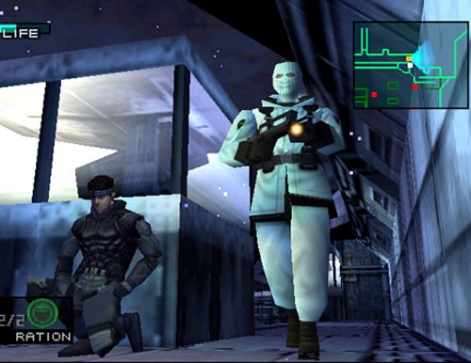Over the past month, we've seen Nintendo announce its entrance as a mobile publisher, while last week - citing competition and lack of growth in the console space - Square Enix and Konami both highlighted that mobile games now would be their priority.
So, in that context, we asked our Mavens:
Will the entrance of such renowned companies fundamentally change mobile games and the industry, or will these company find themselves dashed on the rocks of an already mature market?

Jason Della Rocca is the co-founder of Executions Labs, a first-of-its kind, hybrid game incubator and go-to-market accelerator that helps independent game developers produce games and bring them to market.
Formerly, Jason was a game industry consultant focused on business and cluster development, working with game studios and organizations all over the world.
Prior, he served as the executive director of the International Game Developers Association (IGDA) for nearly nine years, and was honored for his industry building efforts with the inaugural Ambassador Award at the Game Developers Conference.
In 2009, Jason was named to Game Developer Magazine’s “Power 50,” a list which profiles 50 of the most important contributors to the state of the game industry.
As a sought after expert on the game industry, Jason has lectured at conferences and universities worldwide. He also serves on various advisory boards and volunteer roles, such as co-chairing IGDA-Montreal, as an advisor to the ICT Practice of Foreign Affairs, Trade and Development Canada, and serving on the research management committee of the GRAND Network Center of Excellence
This is classic Innovator's Dilemma - the very things you do to succeed today will be the things that hold you back tomorrow.
In a state of disruption, the incumbents are always slow to accept that the ground is crumbling beneath them and thus are late to move.
It is always why the real success tends to come from upstarts that are not encumbered by the old ways. (Supercell being a perfect example of that.)
The old boys either fail outright, or try to M&A their way across the gap.
Will be interesting to see how this plays out.

John is co-founder of PR and marketing company Big Ideas Machine. Also an all-round nice guy...
Jason makes an excellent point - and, as we've seen over the years, successful games companies can be some of the slowest moving when it comes to generational hardware shifts.
The impact of these companies could be significant, or they could just join the ranks of other now established mobile game studios.
But fundamentally I don't see mobile as a mature platform yet.John Ozimek
I think the level of impact depends on whether they really want to embrace a mobile-first world, or simply see mobile as a platform that has started eating into console and PC, and therefore makes reluctant business sense.
It makes me think of Stephen Elop's 'burning platform' analogy.
But fundamentally I don't see mobile as a mature platform yet. Too much depends on the largess of the platform holders, we still have issues around fragmentation, and discovery is still a problem.
It could well be that companies like Konami and Nintendo simply are too set in their ways to bend to the very different rules that mobile has, and also be unwilling to cede as much control as is often required.
I was part of the team at Macrospace back in 2004 when we published the first Square Enix mobile games in Europe - and it was patently obvious that this was a mere distraction for SQEX Japan, based more on the link between Vodafone Japan and Vodafone Europe, and the fact that there was a promo deal already in place.
The fact that it has taken 11 years since that to commit more seriously to mobile gaming makes me think that this is a decision born of necessity rather than seeing a new opportunity.
Without wise M&A deals or partnerships the dinosaurs will fail.
Mobile is a strong market but as you mentioned it's already competitive! Just releasing a game doesn’t work. You need a live team.
Without wise M&A deals or partnerships the dinosaurs will fail.Christopher Kassulke
That’s why some companies need to deactivate or remove their older Android or iOS games (Sega for example).
Also, the brands of my youth are no longer brands of the current gamer generation. So the big guns will have a hard time standing in the fast moving market. They need to change their strategy from one day to next.
You don’t need an army any more, you need special forces to compete. It will be a hard lesson for some as they will have to learn fast or buy in, as Jason said already.
We will see a lot of big deals coming this year in gaming and not all will make sense ;)

Oscar Clark has been a pioneer in online, mobile, and console social games services since 1998. He is also author of the book, Games As A Service – How Free To Play Design Can Make Better Games.
Jason has hit the nail on the head. So that's killed this thread ;0)
However, just a few additional thoughts in case…
I was also asked about this on Twitter the other day by a big Silent Hill and MGS fan and there was the automatic assumption that the transition to Mobile First meant an automatic demise for those great properties and more generally a decline in quality of experience.
Mobile forces us to create leaner, tighter experiences which will eventually benefit console.Oscar Clark
I'm not convinced that such an extinction inevitable, nor that the console is the only space which can create amazing atmosphere.
Look at games like SlenderMan's Forest which although isn't the best art ever absolutely manages to genuinely create real tension through great gameplay (If you let the SlenderMan look you in the eye you die); and it was made by some really young talented developers.
You can feel the fear in the voice of the guy who posted this video *Does contain some swearing.
The point is though that any act of translation does involve a level of adaptation.
We can't expect the move to mobile to leave big branded games unaffected as much as we also don't have to accept a loss in the overall 'quality' of experience. Indeed the infusion of console sensibilities into mobile content could be a huge force for innovation, something I think is currently lacking especially within Free2Play.
Developers have to reimagine those experiences to work with the conditions of these more ephemeral devices which are less about dedicated hours and more about snatched moments.
Mobile forces us to create leaner, tighter experiences which will eventually benefit console; provided we don't lose the nub of what made them great.

Market forces are undoubtedly affecting the 'big blockbuster game' and the console market in general. Mobile is still on the rise, especially in the home markets of these companies. However, there is still a lot of adaptation to be done.
Heck, even King and Supercell have had a variable level of success when trying to create new content, despite their lead titles still dominating the mobile market more than 2.5 years later. Disruption is about doing what others couldn't bring themselves to do,
That takes us back to Jason's point. It's always the upstarts who innovate.

A games programmer before joining Sony’s early PlayStation team in 1994, he then founded developer Pure Entertainment, which IPO’d and launched a free-to-play online gaming service way back in 1999.
He was also a director of pioneering motion gaming startup In2Games, which was sold to a US group in 2008.
Along the way, he’s been a corporate VP, troubleshooter, and non-exec to a variety of companies and investors in and around the games sector.
Harry was European CEO of Marvelous AQL, a Japanese developer and publisher of social, mobile and console games, known for console games like No More Heroes and Harvest Moon, but now highly successful in the free-to-play mobile and web space in Japan and Asia.
Harry is CEO of Magicave.
The moves from these Japanese publishers is largely down to the fact that the Japanese mobile market has overtaken console revenues there in a way that has (yet) to happen in the west.
From a western perspective, it's easy to look at the pulling back of the big console titles from some of these companies as some kind of indication that times are hard for Japanese publishers. They're not.
Dig just a little deeper and we see that, actually, they're doing great - they're just not necessary doing great with products that western gamers want to play.
So we see articles like the one I just read stating 'Troubled Japanese publisher Konami... profits up 150%'. That doesn't sound troubled to me.
What has changed is that the console market in the west has moved heavily towards small numbers of huge-budget triple-A titles. A lot of Japanese publishers (Nintendo excepted) typically make titles for their own market, which sometimes break out and become global hits.
More than any other Japanese company, Nintendo has succeeded in making games and creating brands with truly global mass-market appeal.Harry Holmwood
Increasingly, the publishers are less able and willing to make the $100 million investment needed to make a global console smash, so are looking inward at the very lucrative Japanese mobile market instead.
The companies making big money from Japanese mobile titles are making nearly all of it in Japan - largely because a lot of the titles are difficult to understand for the majority of western gamers, even when well localised.
I think watching Nintendo will be fascinating. More than any other Japanese company, they've succeeded in making games and creating brands with truly global mass-market appeal. If they can hold onto that magic and accessibility while making F2P mobile games, they will be a huge success in mobile.
If they focus on Japan-first titles, they may end up with titles which work really well there but don't resonate so well in the west.
My guess is they'll get it right, though, and will create games that work globally but with the longevity, depth and revenue possibility of the best Japanese F2P titles.
My guess is that these companies have the resources to acquire the mobile game studios they need for success.
Square Enix had a presence at Casual Connect Europe 2015 - where they met with many game studios - for exactly these reasons.

























